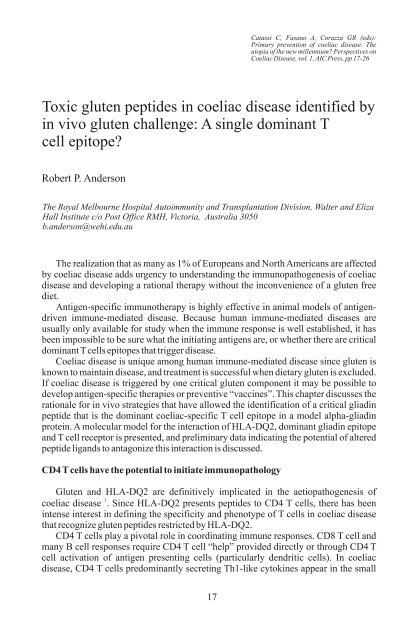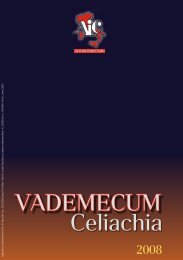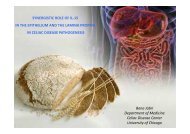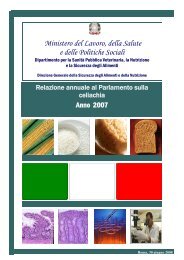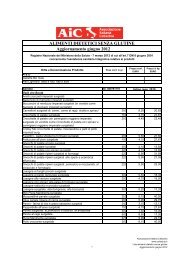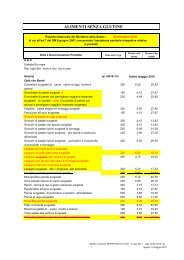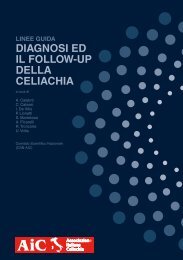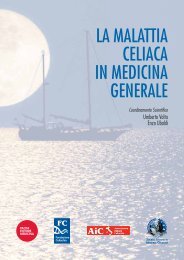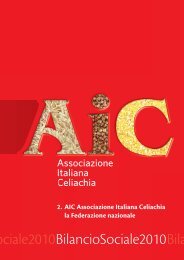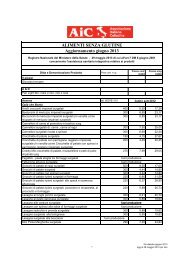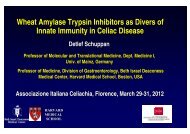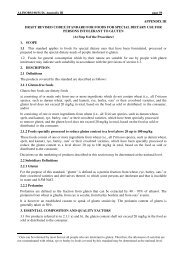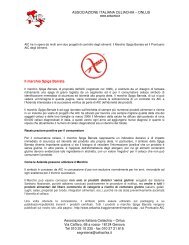primary prevention of coeliac disease - Associazione Italiana ...
primary prevention of coeliac disease - Associazione Italiana ...
primary prevention of coeliac disease - Associazione Italiana ...
You also want an ePaper? Increase the reach of your titles
YUMPU automatically turns print PDFs into web optimized ePapers that Google loves.
Catassi C, Fasano A, Corazza GR (eds):<br />
Primary <strong>prevention</strong> <strong>of</strong> <strong>coeliac</strong> <strong>disease</strong>. The<br />
utopia <strong>of</strong> the new millennium? Perspectives on<br />
Coeliac Disease, vol. 1, AIC Press, pp 17-26<br />
Toxic gluten peptides in <strong>coeliac</strong> <strong>disease</strong> identified by<br />
in vivo gluten challenge: A single dominant T<br />
cell epitope?<br />
Robert P. Anderson<br />
The Royal Melbourne Hospital Autoimmunity and Transplantation Division, Walter and Eliza<br />
Hall Institute c/o Post Office RMH, Victoria, Australia 3050<br />
b.anderson@wehi.edu.au<br />
The realization that as many as 1% <strong>of</strong> Europeans and North Americans are affected<br />
by <strong>coeliac</strong> <strong>disease</strong> adds urgency to understanding the immunopathogenesis <strong>of</strong> <strong>coeliac</strong><br />
<strong>disease</strong> and developing a rational therapy without the inconvenience <strong>of</strong> a gluten free<br />
diet.<br />
Antigen-specific immunotherapy is highly effective in animal models <strong>of</strong> antigendriven<br />
immune-mediated <strong>disease</strong>. Because human immune-mediated <strong>disease</strong>s are<br />
usually only available for study when the immune response is well established, it has<br />
been impossible to be sure what the initiating antigens are, or whether there are critical<br />
dominant T cells epitopes that trigger <strong>disease</strong>.<br />
Coeliac <strong>disease</strong> is unique among human immune-mediated <strong>disease</strong> since gluten is<br />
known to maintain <strong>disease</strong>, and treatment is successful when dietary gluten is excluded.<br />
If <strong>coeliac</strong> <strong>disease</strong> is triggered by one critical gluten component it may be possible to<br />
develop antigen-specific therapies or preventive “vaccines”. This chapter discusses the<br />
rationale for in vivo strategies that have allowed the identification <strong>of</strong> a critical gliadin<br />
peptide that is the dominant <strong>coeliac</strong>-specific T cell epitope in a model alpha-gliadin<br />
protein. A molecular model for the interaction <strong>of</strong> HLA-DQ2, dominant gliadin epitope<br />
and T cell receptor is presented, and preliminary data indicating the potential <strong>of</strong> altered<br />
peptide ligands to antagonize this interaction is discussed.<br />
CD4 T cells have the potential to initiate immunopathology<br />
Gluten and HLA-DQ2 are definitively implicated in the aetiopathogenesis <strong>of</strong><br />
1<br />
<strong>coeliac</strong> <strong>disease</strong> . Since HLA-DQ2 presents peptides to CD4 T cells, there has been<br />
intense interest in defining the specificity and phenotype <strong>of</strong> T cells in <strong>coeliac</strong> <strong>disease</strong><br />
that recognize gluten peptides restricted by HLA-DQ2.<br />
CD4 T cells play a pivotal role in coordinating immune responses. CD8 T cell and<br />
many B cell responses require CD4 T cell “help” provided directly or through CD4 T<br />
cell activation <strong>of</strong> antigen presenting cells (particularly dendritic cells). In <strong>coeliac</strong><br />
<strong>disease</strong>, CD4 T cells predominantly secreting Th1-like cytokines appear in the small<br />
17


